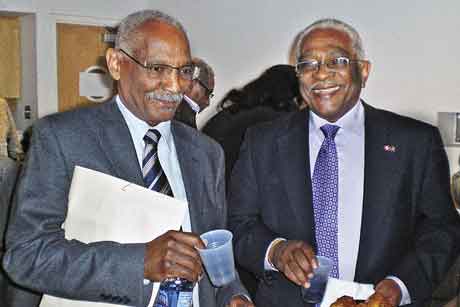Greater Toronto

By William Doyle-Marshall
Money, generous sponsors, abolishing of the present West Indies Cricket Board of Control and serious re-focusing on cricket in schools are suggestions for improving West Indian cricket.
Noted Caribbean scholar Professor Keith Sandiford presented these at York University Saturday March 21, 2009 as he delivered the eighth edition of the Cheddi Jagan Lecture Series. Among lecturers in the past were Janet Jagan, wife of the late Guyanese politician who herself passed away last Saturday, the late Lloyd Best, economist and respected thinker; Winston Dookeran, former Governor of the Central Bank of Trinidad and Tobago and last year Dr. Walton Look Lai, of the University of the West Indies.
Sandiford’s presentation was entitled “Cricket As a Liberating Force in the West Indies” and he cited a litany of areas where the sport served the region remarkably well. He referred to the political arena and unquestionably as a vehicle that lifted many individuals from poverty. However the Barbadian-born scholar was disappointed that the sport failed to play a similar role for women due to chauvinism.
The senior scholar who has been following the sport for decades noted the absence of a sufficient financial base has killed West Indian cricket for the past 15 to 20 years. The Caribbean needs a series of generous sponsors as the government can only do the minimum in the promotion of cricket. While he was unsure how this situation can be rectified, he suggested abolishing completely the present Board of control as a starting point. “It is too unwieldy. It is too numerous. It is too incompetent. I can’t find enough words. We may get better if we begin there. What we then have to do is somehow try to increase the number of first class games that we play during our regular season otherwise we are going to continue to be clobbered by every Lamy and Sammy as we used to say back home.”
The reduction of the number of first class matches played during the Caribbean season over the past ten years means the region was being represented at the highest level by semi pros, playing against hardened professionals.
“The game has become globalized, professionalized, commercialised in places as far apart as Kenya, Namibia, Sri Lanka, Australia etc. there are huge corporations putting money in cricket outside of the Caribbean and our most generous sponsor is Digicel,” the lecturer observed.
Professor Sandiford was astonished that under the existing contract the WICBC is unable to urge Digicel to allow it to use other sponsors.
Asked to assess the West Indies Cricket Board, Professor Sandiford said since its inception in 1927 he has been able to develop the theory of absolute fallibility which means that it is impossible for the West Indies Cricket Board to do anything right. “Even if you are attempting deliberately to do everything wrong, it is possible that ten percent of the time you would, by mistake, get it right. There is no need for me to catalogue the litany of stupidities committed by that board over a span of 80 years. I cannot think of anything the board has done right in all that time,” he surmised.
Sandiford was quizzed about the American television network CNN’s influence on Caribbean youth to point that North American basketball stars are more popular than West Indian cricket stars.
He said students attending the major secondary schools now are really not focusing on cricket seriously as he and his peers did fifty years ago. The only avenue of escape then from poverty was cricket, Professor Sandiford recalled. Now education at every level is accessible and students are interested more in traditional professions. He saw this as a disincentive for major schools in Barbados and elsewhere in the region to concentrate on cricket.
He believed there is too much Americanization of Caribbean culture. In order to undermine the influence of American television, Professor Sandiford recommended that the WICBC make sure there is greater exposure to test cricket especially and first class cricket on the local television. He saw the need for political will on this matter especially when it is clear that not enough is done to advertise or publicize West Indian cricketing stars the way that basketball stars or football stars are showcased in the U.S. and elsewhere.
The lecture series is designed to keep Dr. Jagan’s vision for the region alive.